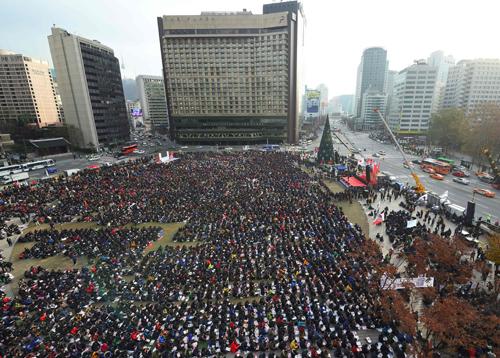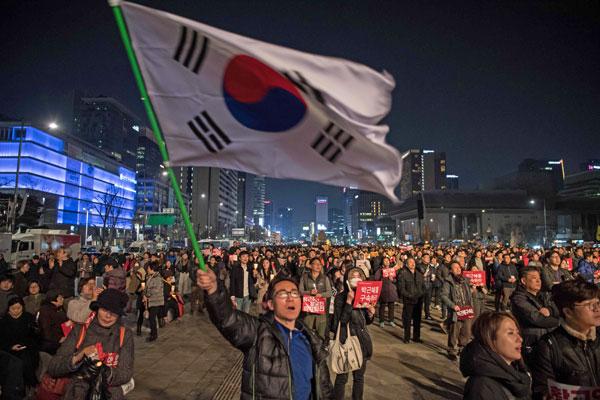You are here
South Korea opposition to push ahead to try to impeach Park amid scandal
Nov 30,2016 - Last updated at Nov 30,2016

Thousands of protesters gather during an anti-government rally demanding the resignation of South Korea’s President Park Geun-hye in central Seoul on Wednesday (AFP photo)
SEOUL — South Korean opposition parties vowed on Wednesday to push ahead to try to impeach President Park Geun-hye, rejecting her offer to resign amid a growing influence-peddling scandal, and called on members of her Saenuri Party to join them.
In a dramatic move that shifted the burden of resolving the crisis engulfing her presidency, Park asked parliament on Tuesday to decide how and when she should quit, which opposition lawmakers dismissed as a ploy to buy time and avoid impeachment.
The leaders of the three opposition parties, which together hold 165 of the single-chamber parliament’s 300 seats and can initiate an impeachment motion, said they would not negotiate with Park’s party on her proposal to step down.
“The only way left to go is impeachment under the constitution,” the head of the Democratic Party, Choo Mi-ae, said at a meeting with the leaders of two other opposition parties.
The leader of the opposition People’s Party, Park Jie-won, said a motion would be put to a vote on Friday, or on Friday week if necessary.
“Impeachment is the only way,” he said.
Park, who has immunity from prosecution in the case as long as she remains in office, is alleged by prosecutors to have colluded with a friend, Choi Soon-sil, to enable her to wield improper influence in government affairs and in fundraising by two foundations set up to back Park’s initiatives.
She has denied wrongdoing but acknowledged carelessness in her ties with Choi.
The opposition parties have said Park missed the chance to step down voluntarily and the public wanted nothing short of her immediate removal from office.
Ruling party divided
They need a minimum of 28 votes from Saenuri to pass the impeachment bill, which will immediately suspend Park’s powers while the constitutional court takes up to six months to decide the validity of the motion.
The court is more likely to take as little as two months, most legal experts said. If Park is unseated, a new election must be held in 60 days to pick a successor for a full five-year term.
The prime minister, normally a figurehead post, would serve as acting head of state in the interim.
The Saenuri Party has been in disarray over the crisis and on Wednesday remained divided.
Party floor leader Chung Jin-suk said it would be best to set a deadline of April 30 for Park to step down, but a breakaway faction of more than 40 members demanded she leave sooner.
Hwang Young-cheul, a member of the breakaway group, said on Tuesday it was willing to negotiate for an exit plan for Park but if all sides failed to reach an agreement by Friday week, it would join the opposition’s impeachment motion.
The crisis has started to weigh on consumer confidence and has dealt a blow to the reputation of the “chaebol” conglomerates, accused of kowtowing to Park and her aide to contribute funds to her foundations.
Finance Minister Yoo Il-ho said on Wednesday the economy faced greater downside risks due to the crisis and a recovery was showing signs of slowing because of uncertainties in South Korea and abroad.
Related Articles
SEOUL — South Korean President Park Geun-hye on Tuesday asked parliament to decide how and when she can give up power over an influence-pedd
SEOUL — Battered by massive protests and an impeachment push, South Korea's president cried Thursday during her first public appearance amon
SEOUL — Tens of thousands of South Korean protesters held rival mass rallies Sunday over the impeachment of President Park Geun-hye as judge


















